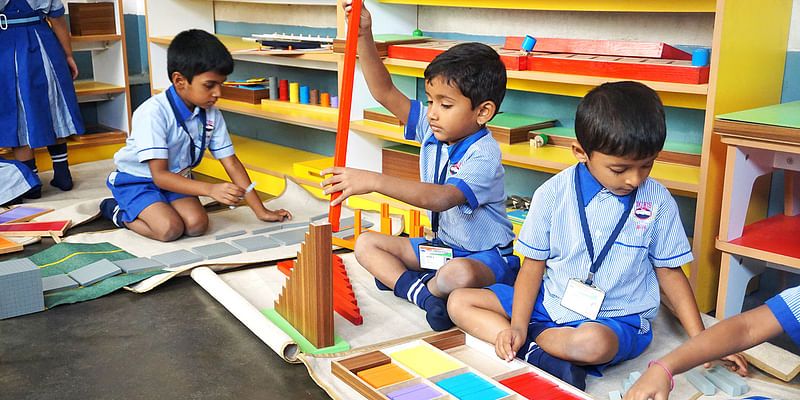
In an ever-evolving landscape of education, it is significant to incorporate pioneering yet innovative and intelligent teaching methods for the holistic development of young minds. With digital transformation at the forefront, technology integration in contemporary early childhood education has opened new gateways to discover fresh and more nurturing channels, specialising in enhancing learning experiences. Today, technology isn’t just an option, but an invaluable tool to curate unparalleled learning experiences.
Boasted with an array of features from Augmented Reality, smart attendance using RFID cards, and transport tracking, to live CCTV streaming, new-age technological tools add excitement and interest to the learning journey. Additionally, it allows parents to be proactive participants in their child’s socio-cognitive development. With a robust tech arsenal, educators can design an interactive learning journey that boosts connection and communication between parents, teachers and students.
Parental involvement and engagement
Parental Involvement in a child’s early education is non-negotiable. With tech integration, parents can be thoroughly involved in their child’s growth without having to neglect either their work or their children. AR tools engage parents in the learning process from home by allowing them to actively participate in discussions and activities, reinforcing what children learn in preschool and having digital meetings with teachers to monitor progress.
Further, live CCTV streaming allows parents to be assured of their child’s safety both inside and outside the school premises as they can keep an eye on the school bus to see when it arrives or leaves, or watch live videos of what’s happening at school. Thus, by leveraging a plethora of cutting-edge tech tools, institutions can facilitate seamless communication between educators and parents, creating a cohesive support system for the child’s educational journey.

.thumbnailWrapper
width:6.62rem !important;
.alsoReadTitleImage
min-width: 81px !important;
min-height: 81px !important;
.alsoReadMainTitleText
font-size: 14px !important;
line-height: 20px !important;
.alsoReadHeadText
font-size: 24px !important;
line-height: 20px !important;

Fostering digital literacy with customised learning
Tech-enabled educational institutions instil students with essential digital skills, which is pivotal for shaping technologically well-versed individuals in today’s tech-driven era. With tech-enabled education, schools can well prepare children to progress in their academic and professional lives but at the same time, the schools must take effective steps to inculcate digital skills by creating a personalised learning plan.
Dedicated to creating a welcoming and nurturing space, a tech-integrated curriculum inculcates digital literacy by applying adaptive technology and defining a learning journey like no other. By presenting a first-hand customised learning experience, technology allows learning institutions to do both- inculcate digital literacy and ensure every child’s progress at a pace that is suitable to them.
Art of visualisation and imagination
Augmented Reality possesses the ability to bring abstract concepts to life. Institutions embedding AR into their educational journey can transform into learning havens. This visual aid allows young learners to interact with 3D learning models, helping them understand the nuances of every concept in great detail. Offering virtual experiences that transcend immediate geographical boundaries, AR sparks the ethos of imagination enabling children to explore diverse cultures and ideas.
Interactive, engaging, and multi-sensory learning
Leading-edge technology integration offers learners a blend of interactive and multi-sensory learning experiences by harmoniously combining audio, tactical and visual elements. AR engages preschoolers in a journey that stimulates them to see, hear and interact with virtual objects catering to different styles, contributing to enhanced understanding. Thus, by fostering hands-on, playful and interactive learning lessons, teachers can keep children entertained, motivating them to participate, explore and learn.
Real-world application to boost curiosity
AR technology perfectly converges virtual information with the real world, connecting abstract concepts with real-life experience. This creates curiosity and encourages the spirit of exploration. Possessing the potential to simulate scientific experiments, historical events or even nature exploration, it helps pre-schoolers understand complex ideas in simplified real-world contexts, fostering a curiosity-driven learning experience.
Bridging the gaps of the past, technology brings together parents, educators and students under a unified learning pool, fostering an educational experience that is personalised, innovative and engaging. Thus, preschools embracing technology can effectively prepare children for a future where technology is seamlessly integrated into various aspects of life while nurturing their curiosity, creativity, and ephemeral love for learning.
(Dhruv Ahuja is the CEO and Founder of Ikidz, which focuses on early childhood education in India.)
Edited by Kanishk Singh
(Disclaimer: The views and opinions expressed in this article are those of the author and do not necessarily reflect the views of YourStory.)










